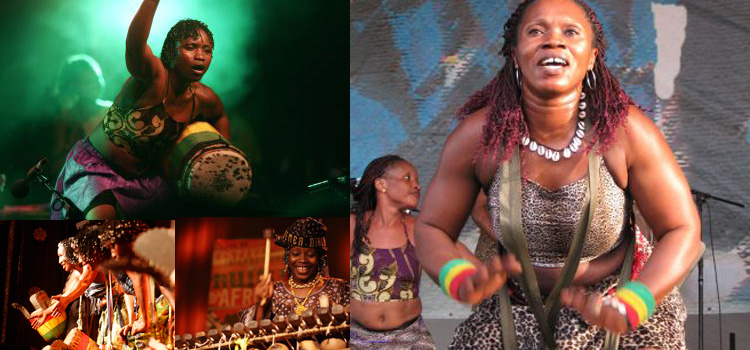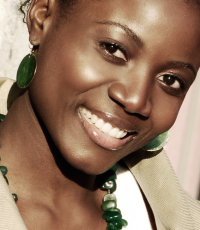
Their arms are muscular but not unattractive. Their bodies look tough yet almost tender looking. The sounds from their drums say a lot—they reverberate with power, strength, control and something indescribable. These are the Amazones Women Master Drummers, yes you heard right, women master drummers who have squashed many norms in African society.
It all began in 1997 when Mamoudou Conde, master sculptor and carver from Guinea, initiated the idea of having women play traditional instruments typically reserved for men at a professional level – a stage very unfamiliar to women in Guinea at the time and perhaps even unheard of in African history.
As Managing Director for the Guinea National Percussion (Les Percussions de Guinee) and Les Ballets Africains, one of the largest companies on the continent operating since 1952, he divided his time between Guinea and the U.S. During most of his international tours, Conde observed that Western women showed an eagerness to learn to play the Djembe, whereas those from its origin exhibited the opposite. This triggered a desire in him to start the group in spite of the challenges he knew he would face at gathering willing and interested participants. He viewed this position of sharing his world – Africa – with the west as one that helped him gain a better understanding of African women and conditions that hindered them from breaking out of their shells. This new perspective developed into an interest to “build a bridge to empower African women around the world and make role models out of them.”
“I think it was the right timing, and I was the right person at the right place to start this with less trouble,” Conde says about the consequences of organizing such a movement in a culture that would have viewed it as a taboo.
By 1998, Amazones Women Master Drummers was finally formed and later received assistance from the Guinea Department of Culture after a period of reluctance. The administration agreed to allow its male national group to train the women as such instruments were only played by men at the time.
“I wanted inner city young women who barely had their lives together. Those are the types of women I wanted to bring together to be able to give them a hope in life,” Conde expresses his interest to specifically recruit women who were hopeless and left in desperate positions. During their tours, young women who had been unable to receive education due to financial reasons were assisted to read and write both French, the official language of Guinea, and English. From different parts of the country they came, and together have become a symbol of hope for women in different parts of the world.
Fatoumata Bangoura, known as the best female player of the Djembe instrument and first to become a master of it says:
“The message I have for other women as a role model is to give them the courage to do anything they feel like doing because when we were born, they used to say that women were not supposed to touch even the Djembe, but we went and did it. When you have courage, you can do anything you want to do. It’s not only me, it’s many other women in this group with me, but all decided to touch the traditional instrument. If we can do it, any other woman in the world can do it. Our message is to give them the courage, to really get up and do anything and succeed.”
Conde seems to have done an excellent job of achieving his main objectives with Amazones Women Master Drummers since its inception.
Maimouma Sylla, one of the most powerful female players of the doundoun instrument, is the only female to have ever reached the same level of skill needed to play this piece of equipment. Doundoun is the largest of the instruments and it is the foundation of all the rhythms, without it everything collapses, explains Conde. It was the first that attracted Sylla and she has mastered it ever since.
“When I stand on stage, I just want to take over, control the entire stage and the audience,” she says about the power and joy she gets from the instrument she has fallen in love with, one she is best at not only among the women but also men in Guinea today. “I know the instrument loves me and I love it,” Sylla says with passion.
About being the best female player of the doundoun instrument, Sylla says, “It makes me feel good about myself. It makes me feel strong, powerful and it gives me an intense strength that any woman would like to see herself in.”
The group recently performed at the New Orleans Jazz festival where they played four concerts. They are also open to various shows including one for the youth. “We do a lot of work with young folks which help many children to understand more about their own culture,” says Conde, “Because when you learn about other people’s culture, it gives you a basic understanding about your own culture.”
Between 2006 and 2007, the group has been able to work with almost 100,000 children through the support of various cultural centers in the United States and other major international organizations and has toured Europe, Africa, Canada and North America.

